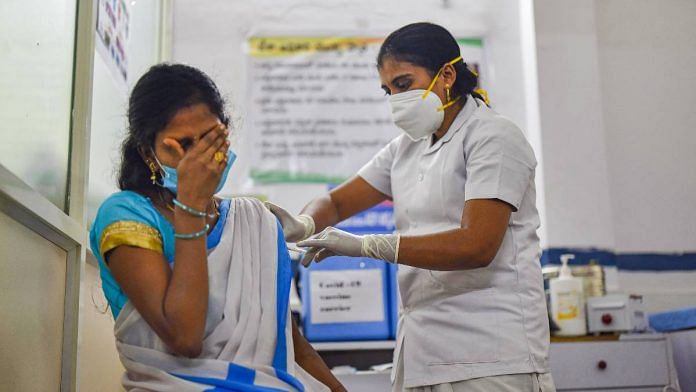
New Delhi: Covid-19 vaccine hesitancy is not as prevalent among Indians as in other parts of the world, an international survey conducted across 15 countries has found.
According to the survey, conducted by the Customized Intelligence Business Unit of US-based consumer intelligence firm NielsenIQ, around 49 per cent of Indian respondents said they will wait a while to take the vaccine, compared to around 64 per cent among the overall pool.
The majority of Indian respondents, 51 per cent, said they will take the vaccine immediately.
Conducted online, the survey sought to highlight consumer hesitation towards immediately changing spending habits even as the vaccine rollout gains ground.
It involved 15,000 respondents from Australia, Canada, France, Germany, India, Japan, Mexico, Russia, South Africa, Spain, Thailand, Turkey, the UAE, the UK and the US. Just over 1,200 of the respondents were from India.
Among Indian respondents, 84 per cent said they changed their spending habits during the pandemic. However, 65 per cent of Indians indicated that they will be more confident of their financial situation when vaccine timelines are announced.
Vaccine scepticism may delay the restoration of “normality and pre-pandemic economic stability” across the world, the survey report says, but adds that India has shown early indicators of a “positive mood shift” compared to other countries in terms of accepting the vaccine and consumer spending.
Consumer habits unlikely to change
Wide availability of the vaccine, the survey found, is unlikely to bring a vast shift in consumer spending patterns. As many as 72 per cent of the respondents said their spending habits vis-a-vis groceries won’t change, while 16 per cent expect to spend more. Twelve per cent said they will spend less.
This, the survey says, suggests there is “significant ground to make up in reversing consumer habits and attitudes as the world embarks on achieving herd immunity”.
The survey also found that 58 per cent of the respondents still lack the confidence to dine out, while 65 per cent are hesitant to attend live sports events. Around 70 per cent said they lack the confidence to travel overseas just yet.
Scott McKenzie, the global Intelligence Leader of NielsenIQ, said the confidence levels around the vaccines and the desire to take the vaccines “certainly may change as countries begin more concerted rollouts and deliver education campaigns around the vaccines”.
“But clear signals indicate that the arrival of vaccines won’t automatically flip a switch to put the world back on its pre-Covid path,” he added in the report.
“Our findings in India show early indicators of a positive mood shift compared to several other markets we looked at, but caution will continue to guide consumer spending over at least the next few months.”
Subscribe to our channels on YouTube & Telegram
Why news media is in crisis & How you can fix it
India needs free, fair, non-hyphenated and questioning journalism even more as it faces multiple crises.
But the news media is in a crisis of its own. There have been brutal layoffs and pay-cuts. The best of journalism is shrinking, yielding to crude prime-time spectacle.
ThePrint has the finest young reporters, columnists and editors working for it. Sustaining journalism of this quality needs smart and thinking people like you to pay for it. Whether you live in India or overseas, you can do it here.